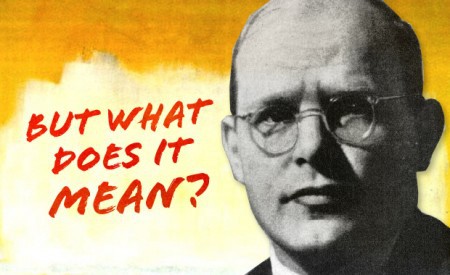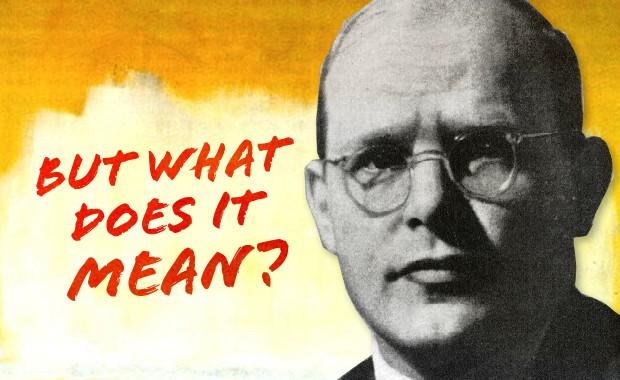The only thing I remember from my first 12-step meeting is a feeling. Before the meeting, I was scared, confused, embarrassed, and depressed. But in the meeting, I felt that I was in the right place. There really was no thought associated with it, other than “These people are like me, and they are sober, and I am not.” The main thing, though, was a deeply-felt sense that this is where I need to be.

As I kept coming back, I got to know the other people in the room, and life carried on outside the room. And then another voice kicked up in my head: The Skeptic. When somebody shared something I didn’t identify with, or something about the program felt uncomfortable, or somebody said they were grateful to be an addict, or mentioned Jesus, the Skeptic said to me, “What the hell are we doing here with these people?”
Well, one of the great lessons of my recovery, which I still resist in many ways, is to trust the feeling more than the thought.
I have also learned to accept, but not blindly follow, that skeptic.

In the meetings, we use a great expression about taking what you need and leaving the rest. The guy who mentioned Jesus, for example, may have also done some Step work I can identify with. When the program didn’t feel comfortable, I could ask myself if maybe uncomfortable is just what I need to feel – after all, doing what made me feel comfortable kept me stoned and out of the meetings for a long, long time.
As I have moved on through life since then, I have had many of these intuitions, especially in my spiritual quest. And this means I have had many, many conversations with this skeptic.
I remember once getting a sense that I should check out a particular church, but the skeptic said it was only because I was attracted to the woman who told me about it. Because I was on fire with recovery in those early days, I was able to respond with, “Yes, I am attracted to her, but I’m also attracted to that church, and I am trying to practice spiritual open-mindedness.” I went to the church, heard an amazing message from the preacher, spoke to him afterwards, and found out he had 17 years in recovery! I went home even more on fire with recovery, carrying a gift from my Higher Power, and was grateful for the whole process. I also never did anything about my attraction to the woman, and in fact she married a great guy from that church.

Of course, not all these skeptic chats go so well. I can’t even catalog how many times that voice at least sowed enough confusion and doubt that I didn’t act on an impulse. That could involve spiritual leanings, other attractive women, professional decisions, things that needed saying … the list goes on and on. The skeptic is really just a fear voice, trying to keep me comfortable and assure me that my way of doing things will work. The more I meditate, go to meetings, and talk honestly and openly with people in recovery, the more I can stay centered within my true self, and the more I can recognize when I’m just hearing a voice of my fear.
Still, what to do about that voice of fear? After all, this skeptic, and all the other fear voices, aren’t going anywhere. They don’t have an “off” switch. So here is what I try to do – and, again, what I am better at doing when my spiritual condition is being well maintained.
First, I acknowledge its presence, because stuffing it or telling it to go away only strengthens it. Second, I hear it out. I don’t argue with it or cut it off; I let it have its say. Then I try to remember that this voice is trying to help me – to protect me from falsehoods, from danger, but also from discomfort. Some of those things I need protection from, so I also remember that this skeptic is, in fact, part of me – and a valuable part at that. So I thank it and acknowledge that there may well be, in fact probably is, a good deal of truth in its words. Then I consult other voices and move forward, trusting my intuition and asking for more help from my higher power.

Here is an example, which is fresh on my mind. I just got back from a retreat with a man named Hank Wesselman, who teaches the shamanic journey method. Basically, it’s a meditation method in which people connect with helping spirits in the dream world, for the purpose of gaining power, protection, and support, and eventually to be of service to the community. Perhaps you’ve heard of the notion of a power animal or spirit guide? That’s what this is about, plus a whole lot more.
Now, if your inner skeptic just started talking to you, join the club. In my case, I have always had experiences which I chose to think of as connecting with beings in the spirit world. I don’t claim that that’s absolutely true, much less that you should be doing it, but it works for me. And yet there are times in Hank’s workshop – and with every other spiritual teacher I have ever encountered, including my 12-step sponsors – where I completely buy in to the skeptic and think, “You’ve got to be fucking kidding me!”
The most profound example of this was in another Hank workshop, where I woke up in the middle of the night with a very clear vision that this dude was just another guy who claims that his way is The Way, writes a book about it, then travels around teaching the book on the workshop circuit, collecting piles of money from chumps like me. I had decided that all we were really doing was connecting with our subconscious, not some damn “spirit world,” and we were just looking for validation of what we already believed or wanted to believe. Honestly, lying there that night, I was ready to pack up and split.

Then the next level happened: I said to the skeptic, “Well, that may be true. But let me ask you this: What is the subconscious? What is our intuition, and where does it come from? Aren’t those things mysteries? And don’t we just label our mysteries so we can think we control them? Maybe there’s something Freud calls the id and Jung calls the unconscious mind and Hank calls the Spirit World. I don’t need any of them, because I have connected with … something … that helps me and seems to have good advice for me. So I’ll keep going and do my own thing.”
It’s basically the same conversation from my early 12-step days: I have no idea how this thing works, but I can’t stay sober, these folks can, and yes, some of them are crazy and/or full of shit, and there parts of the program that make me want to run away … but something here works and feels right, so I’ll go with it and see what I can find out.
The result of that decision is 14 years of continuous sobriety. The result of my midnight workshop decision was an experience the next morning that was so profound and deep that I had tears streaming down my face and the results of it are still playing out in my life today.

So … How does recovery work? What is the subconscious? Is there a Spirit World? Are all teachers full of it? I don’t know, and I don’t really care. If something feels right and helps, I try to go for it. I think it comes down to which story you want to believe, which world you want to live in, and what belief system you want to build a life around.
As for me, I believe that working the 12-step program keeps me sober, that there is a multi-layered Spirit World full of helping beings made of light, that mythology and symbolism are very real, and that magic is flowing in the world all the time. But that’s just me.

Meanwhile, I carry within me a skeptic who thinks every single bit of that is bullshit. And he may be right! Anyway, he’s just trying to help, and he is helpful: he reminds me that no single path or teacher is the ultimate; that my way is just my way, not yours; and that ultimately I am the one who must find and walk my path.
So my skeptic is absolutely welcome on the bus. I just try not to let him drive too much.
Thanks for reading.
You can find more shares like this here.









